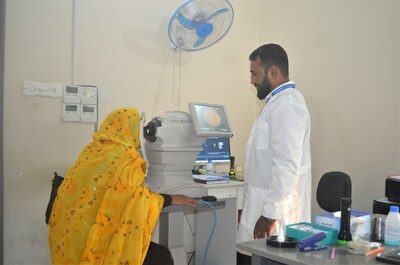Source prnewswire
Study Finds Autonomous AI Boosts Medical Caregivers’ Productivity by 40% in Bangladesh
UNITED STATES, NEXT MONTH, NOV.. It was announced today that Orbis International, Digital Diagnostics, and the Deep Eye Care Foundation, Bangladesh, have released new findings demonstrating that autonomous artificial intelligence significantly increases the productivity of medical caregivers testing for diabetic eye disease by 40%.. In a peer-reviewed randomized controlled trial study published in Nature, the authors explore how autonomous AI can improve the productivity of healthcare professionals worldwide, giving them the opportunity to see more patients while prioritizing those who require their expertise and care.. The results of this study, which was conducted in Bangladesh, demonstrate the potential use of autonomous artificial intelligence to increase access to essential services and reduce health inequalities, especially in low and middle-income countries where specialists are in short supply The results of this study, which was conducted in Bangladesh, demonstrate the potential use of autonomous artificial intelligence to increase access to essential services and reduce health inequalities, especially in low and middle-income countries where specialists are in short supplyThe results of this study indicate that autonomous AI can be used to make accurate medical decisions and improve the efficiency of clinics. In the United States alone, there are an estimated one billion people living without access to basic health services," said Dr.. The Country Director of Orbis Bangladesh is Munir Ahmed. According to the World Bank, this disparity prevents global economic growth and perpetuates the widening poverty gap around the world. The best way to deal with this problem is to employ technology in order to increase efficiency and productivity. According to this study, an autonomous artificial intelligence system can be used to make accurate medical decisions and improve the efficiency of clinics. The autonomous AI system is not meant to replace a doctor; rather, it is meant to be used as a tool to streamline the clinical process and enhance the quality of the care.." " There are estimated to be one billion people worldwide without access to basic health services, according to Dr.. The Country Director of Orbis Bangladesh is Munir Ahmed. "This disparity hinders the growth of global economic growth and perpetuates the widening gap between the wealthy and the poor". In order to solve this problem, one way is to use technology in a way that increases efficiency and productivity. The findings of this study show that autonomous artificial intelligence can help make accurate medical decisions and improve the efficiency of clinics. The autonomous AI system does not replace the role of a doctor, and rather it acts as a tool to improve the efficiency of the clinical process as a whole The autonomous AI system does not replace the role of a doctor, and rather it acts as a tool to improve the efficiency of the clinical process as a whole"A few years ago, I had a vision of the impact autonomous AI would have in healthcare, but I soon discovered that vision, validation, and commercial adoption are very different things," said Dr. Cheng.. The principal investigator of the study and the founder and executive chairman of Digital Diagnostics is Michael Abramoff. Over time, I have realized that it will take a lot of work to get autonomous artificial intelligence accepted by all stakeholders so that it can be widely deployed and have a positive impact on patients. Finally, we have robust scientific evidence that autonomous AI is not only improving outcomes for the patient, but as this study shows, it is also improving productivity in the healthcare sector.. As I see my initial vision being fully realized through our partnership with Orbis International and Deep Eye Care Foundation using LumineticsCore, it is a validation of everything we have been working for over the past year and a half. The expansion of this collaboration both in Bangladesh and in other countries is something we are looking forward to The expansion of this collaboration both in Bangladesh and in other countries is something we are looking forward toDuring the course of five months in 2022, this randomized controlled trial was conducted in retina specialist clinics at Deep Eye Care Foundation in Rangpur, Bangladesh.. Over 2,000 patients were included in this study. They were randomly assigned to either an intervention group or a control group. According to the study, patients in the control group went to the specialist regardless of the results of the autonomous AI. The intervention group of patients did not see a specialist during their visit if the autonomous AI did not detect signs of diabetic eye disease and were instructed to return in twelve months if the AI did not detect signs of diabetic eye disease. A specialist was only seen if the autonomous AI detected diabetic eye disease and further treatment was needed.. It was found that the autonomous AI resulted in a 40% increase in the number of patients that completed a high-quality eye exam within an hour as a result of the program It was found that the autonomous AI resulted in a 40% increase in the number of patients that completed a high-quality eye exam within an hour as a result of the program


No Comments